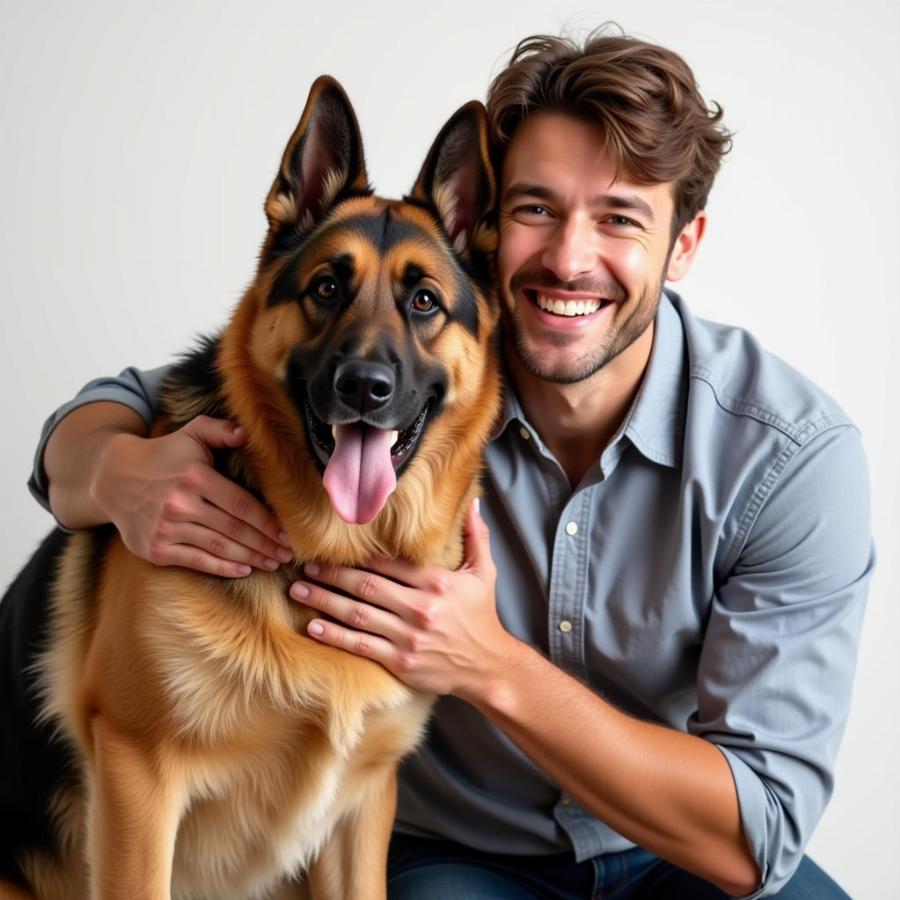A male dog is called a dog. While it might seem obvious, many people wonder if there’s a specific term like “buck,” “bull,” or “boar” used for other male animals. Nope! Just plain old “dog.” But within that simple term, there’s a world of canine diversity. From playful puppies to dignified seniors, “dog” encompasses every stage of a male canine’s life. This article dives deeper into the world of male dogs, exploring everything from their unique characteristics to their specific needs.
Understanding the Term “Dog” for Males
So, why just “dog”? Historically, the term has always been used for both male and female canines. While we have specific terms for intact male dogs (studs) and castrated male dogs (neutered dogs), the general term remains “dog.” This universal term makes it easy to refer to any male canine, regardless of age, breed, or reproductive status. It’s simple, straightforward, and universally understood. What do you call a male German Shepherd? A dog. What do you call a male Chihuahua? A dog. See? Easy!
Male Dog Characteristics: Are They Different from Females?
While the basic term is the same, male and female dogs often exhibit behavioral and physical differences. Generally, male dogs tend to be larger and more muscular than their female counterparts. They can also be more energetic and playful, especially when not neutered. However, it’s crucial to remember that breed and individual personality play significant roles. Just like humans, not all male dogs are the same!
What about Neutered Males?
Neutering a male dog can significantly impact its behavior. It often leads to a decrease in roaming, marking, and aggression towards other males. Neutered males may also be less prone to certain health issues, making the procedure a responsible choice for many owners. However, neutering doesn’t completely erase a dog’s personality; a naturally playful dog will likely remain playful, though perhaps less driven by hormones.
Caring for a Male Dog
Caring for a male dog isn’t drastically different from caring for a female. The basics remain the same: providing a balanced diet, regular exercise, mental stimulation, and plenty of love and attention. However, there are some specific considerations for male dogs, especially concerning their reproductive health.
Health Concerns Specific to Male Dogs
Male dogs can be prone to certain health issues, including testicular cancer and prostate problems. Regular veterinary check-ups are crucial for early detection and treatment. Additionally, responsible pet ownership includes making informed decisions about neutering, which can significantly reduce the risk of these health problems.
Do Male Dogs Need Different Training?
Not necessarily. While some believe male dogs are more challenging to train, this is often due to their higher energy levels and tendency to be easily distracted. Consistent, positive reinforcement training works wonders for both male and female dogs. Establishing clear boundaries and providing plenty of mental and physical stimulation are key to a well-behaved and happy canine companion.
What About Names for Male Dogs?
Choosing a name for your male dog is a fun part of the pet ownership journey! Popular names for gun dogs can offer inspiration, as can considering names related to your dog’s personality or appearance. The possibilities are endless!
 Happy Male Dog with Owner
Happy Male Dog with Owner
Conclusion
While the term for a male dog is simply “dog,” understanding the nuances of male canine behavior, health, and training is crucial for responsible pet ownership. By recognizing their unique characteristics and providing appropriate care, you can ensure a long, happy, and fulfilling life for your male canine companion.
FAQs
- Is a male dog called anything other than “dog”? Generally, no. While terms like “stud” and “neutered dog” specify reproductive status, “dog” is the universal term.
- Are male dogs more aggressive than females? Not necessarily. Aggression can be influenced by many factors, including breed, training, and individual temperament.
- When should I neuter my male dog? Consult your veterinarian. They can recommend the best time based on your dog’s breed and health.
- Do male dogs require special food? Not typically, but dietary needs change with age and activity level. Consult your vet for recommendations.
- Are male dogs harder to train? Not intrinsically, but their higher energy levels can make training require more patience and consistency.
- How can I prevent my male dog from marking territory? Neutering can help, as can consistent training and cleaning marked areas thoroughly.
- What are some common health problems in male dogs? Testicular cancer and prostate issues are common concerns.
More Questions?
Check out these related articles for more information on dog care: names for gun dogs, dog knot cream pie, dog pee strong smell, and can dogs go through menopause.
Beaut Dogs: Your Go-To Resource for Canine Care
Beaut Dogs is your one-stop shop for all things canine! We provide expert advice and resources on everything from breed selection to health care, nutrition, and training. When you need support, contact us at Email: [email protected] to get detailed and accurate answers from Beaut Dogs. Visit https://beautdogs.com today to explore the wonderful world of dogs and learn how to provide the best possible care for your furry friend!